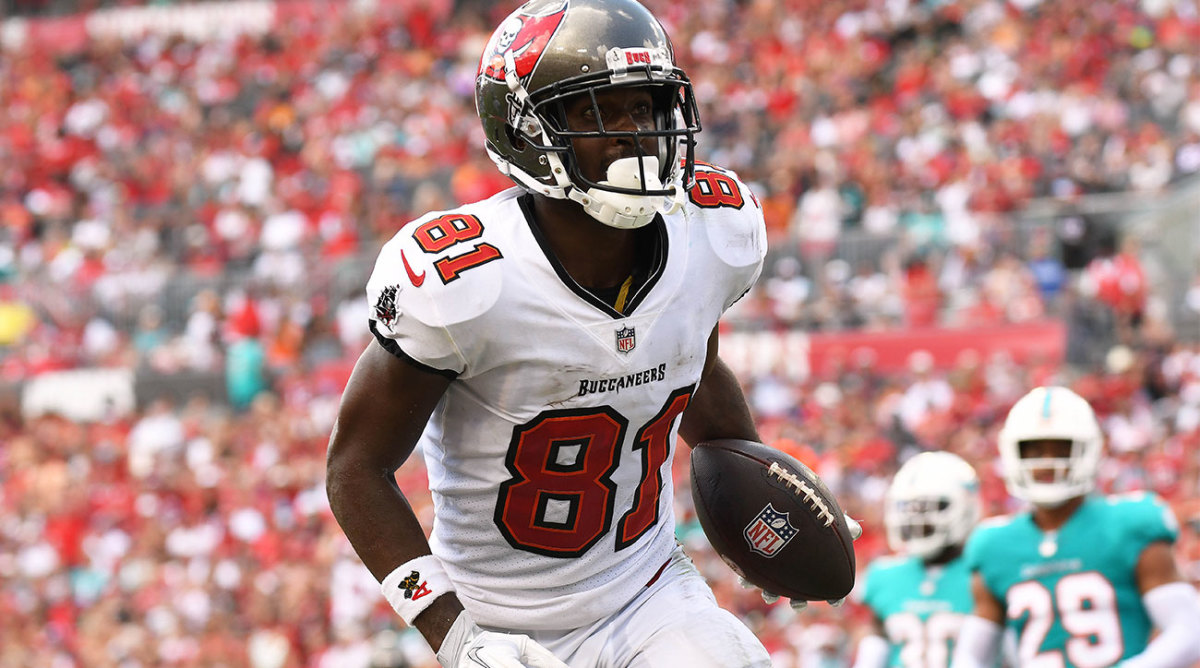A Fake Vaccine Card Would Be the NFL's Most Serious Breach of COVID-19 Protocol Yet
Amid allegations from a former personal chef that he used a fake COVID-19 vaccine card to subvert NFL protocol, Antonio Brown, through his representatives, is claiming he has received the vaccine. Brown’s girlfriend has also denied knowledge of text messages that are alleged to have been sent by her to request that the chef procure these forged documents.
The Buccaneers, too, are denying that any of the vaccine cards they received pictures of seemed suspect. In a statement released shortly after Brown’s ex-chef went public to The Tampa Bay Times, the team did not intimate that its status as one of the first clubs to achieve 100% vaccination was in jeopardy.
Given that we are in the volleying stages of this development, with agents and lawyers, media fixers (yes, Brown’s former chef obtained the services of a high-level Hollywood media operator, also according to The Tampa Bay Times) and public relations officials batting the ball back and forth, we don’t know the full truth quite yet. What we do know is that this story originated from yet another scorned former Brown employee—a deep lot of people whose complaints have ranged from missed payments to sexual misconduct. Brown is a player whose abhorrent treatment of people has followed him from city to city, but that does not mean he is guilty here.

Regardless of what happens next, we are free to wonder if the NFL is prepared to deal with discovering that players and other league personnel have used fake vaccination cards. There were reports of their existence back in September. The NHL suspended Evander Kane, a San Jose Sharks forward who was caught with a fake card, for about a quarter of the season. Given what it would mean to the NFL, on the heels of an Aaron Rodgers melodrama in which the quarterback artfully deceived the media about his vaccination status by avoiding protocol only in public-facing media events, one would imagine that the NFL could—and should—come down much harder than the NHL did.
If any player is caught using a fake vaccination card, the minimum ban should be for an entire season. If the player in question has a history of rule-bending behavior, it should formulate the foundation for a permanent expulsion.
To be clear, this is not another debate about the merits of the vaccine. Whether you choose to side with mainstream scientists or alternative thinkers of the internet, lying about your actual status and then avoiding the protocols put in place would undoubtedly be the lowest form of deceit. Regardless of whether a player believes in the safety or efficacy of the vaccine, they are, by playing in the NFL, entering into a social contract with one another—with a great deal of players who are afraid of the virus, have felt its effects, have loved ones at home they wish to protect and would like to know if the man sitting next to them maskless is telling the truth about his vaccination status. We are in the midst of a pandemic that has killed more than 5 million people worldwide. A perfectly healthy 27-year-old NFL player was hospitalized with COVID-19 and called it one of the “lowest points” of his life. A perfectly healthy 32-year-old Major League Baseball player was pummeled with the disease to the point where he prayed not to die. It’s safe to say they would not like that to happen again.
If you’re vaccinated, you’re not putting me at nearly as much risk. If you’re unvaccinated, at least you’re wearing a mask, keeping your distance and avoiding the sauna. This is the arrangement agreed to between both the league and the NFLPA.
It’s unfortunate that the NFL forced teams to play amateur sleuth and review the authenticity of these cards, opening up the process to the speculative game of True Detective it could become. It’s unfortunate that we’re existing in a state of play where athletes don’t feel safe discussing their vaccination status and have gone to great lengths to avoid the subject. When an allegation rises to this level, it makes the entire system feel flimsy and collapsible. What happens if the allegations against Brown are substantiated? Or if another player is found to have used a fake? What would that mean for interpersonal relations in NFL locker rooms, never mind larger questions about how the league operates with the virus long-term?
A firm punishment—if one is warranted—would go a long way toward curbing future attempts to circumnavigate the safeguards put in place. If a fake vaccine card was ever discovered, a year-long ban or, perhaps something more significant, would do what previous punishments have failed to do, which is stopping the attempted subversion in its tracks.
The league had its chance a year ago, when the Broncos’ quarterbacks all placed their contact tracing devices more than six feet apart and clustered together to watch film, hoping to fool the devices while enjoying some creature comforts of pre-pandemic life. The result was having a wide receiver start the game at quarterback, an embarrassment on its own that, at the time, may have been seen as the most fitting punishment.
But those players knew what they were doing. They all entered into another social contract together that day. They decided they were individually O.K. with putting each other’s safety at risk. A fake vaccine card takes away that choice, which is why, if someone is found to have used one, it should be treated as the worst offense we’ve heard of in two seasons of pandemic football.
More NFL Coverage:
• Daily Cover: A Quarterback Evolution and Coaching Revolution
• The Seahawks Should Be Preparing to Trade Russell Wilson
• MMQB: Rodgers Returns, Other Packers Step Up
• Browns Fans Are Allowed to Be Disappointed by This Season
